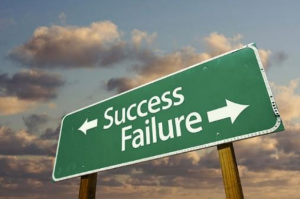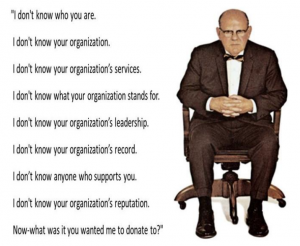I recently met with the CEO of a well-established organization in the Phoenix area to explore the potential for a major multi-million-dollar capital campaign. Initially, I was confident that this organization could handle such an ambitious project. However, after reviewing their 990s, I was taken aback. The organization was raising only a third of what I expected annually. During my meeting with the relatively new CEO and learning about the high turnover in their development office, it became clear that without several seven-figure committed prospects, their chances of a successful campaign were slim.
We discussed various strategies to prepare for a campaign over the next twelve months. Key recommendations included stabilizing the development team, improving donor engagement, and setting clear, achievable fundraising goals. The CEO admitted her limited knowledge of fundraising and managing the development team effectively, which reminded me of an article I wrote a few years ago. This article outlines some fundamental strategies for managing development, major, or planned giving officers, emphasizing the importance of consistent donor interactions, setting realistic goals, and maintaining detailed records of donor activities.
Effective fundraising is not just about having the right people in place but also about ensuring those people are doing the right things consistently. I hope you find the principles and strategies outlined in this article as valuable as I do in guiding your organization to fundraising success.
Many people within a non-profit organization might assume that the role of a Development Director is quite comfortable. It involves attending meetings with fascinating individuals, enjoying meals and rounds of golf, attending black-tie events with influential figures, having direct access to the CEO, and traveling to exciting destinations. It seems like a dream job, right?
The reality, however, is that being a Development Director is one of the most demanding roles in the nonprofit sector. Over my four decades in philanthropy, I have encountered various individuals in this role, and sadly, often, they struggle to succeed. Sometimes, it comes down to a matter of “fit”—not everyone is cut out for this line of work. It requires a unique blend of skills and abilities, mostly sales ability. Yet even those who possess the right attributes can falter if they do not focus on the correct actions.

The reality, however, is that being a Development Director is one of the most demanding roles in the nonprofit sector. Over my four decades in philanthropy, I have encountered various individuals in this role, and sadly, often, they struggle to succeed. Sometimes, it comes down to a matter of “fit”—not everyone is cut out for this line of work. It requires a unique blend of skills and abilities, mostly sales ability. Yet even those who possess the right attributes can falter if they do not focus on the correct actions.
Directors—outcomes are straightforward and measurable. (I often joke with my colleagues in Public Relations that fundraising is akin to PR, but with built-in accountability. They usually do not find it as amusing as I do). Unfortunately, many organizations lack a structured plan with clear outcome objectives, making success or failure a matter of perception.
I contend that in development, non-profit leaders should place greater emphasis on tracking and managing processes rather than just results. Do not get me wrong, results are crucial. However, good outcomes stem from consistently applied, effective activities. There is no secret formula. Numerous factors—both known and unknown—can significantly influence fundraising results. But if your development team consistently engages in the right activities, the chances of achieving successful outcomes—such as raising more funds—are increased. Conversely, if they are diligently doing the right things but still not seeing satisfactory results, it is time to scrutinize other factors related to your donor base, programs, and overall organization.
1. How many future donor meetings did I schedule?
Building a routine of regularly scheduling donor meetings is essential. Set aside dedicated time each week to call and arrange future appointments. Consistency in this practice ensures a steady flow of meetings and helps maintain momentum in donor relations. Developing a habit of scheduling future meetings prevents lulls in engagement and keeps the relationshipbuilding process ongoing. Use a systematic approach to ensure no potential donor is overlooked and maintain a pipeline of future engagements.
2. How many new donor contacts did I establish?
Following up on referrals and reaching out to new donors is crucial. Make initial contact through phone calls, personal visits, or event invitations. Additionally, ensure that new donors receive personal follow-up after their first gift to increase the likelihood of continued support. Establishing new donor contacts requires a tailored approach, understanding each new donor’s interests, and providing them with a clear understanding of how their contributions make a difference.
3. How many phone calls did I make to donors?
Managing donor relationships requires frequent communication. While face-to-face meetings are ideal, regular phone calls are also important. Avoid relying solely on email; a personal phone call is more impactful and helps build stronger connections with donors. Phone calls allow for immediate feedback, answer questions, and address concerns promptly. They also serve as an effective way to maintain contact between in-person meetings, ensuring donors feel valued and engaged.
4. How many face-to-face meetings did I have with donors last week?
Nothing beats the impact of direct, personal meetings with donors. These one-on-one interactions are crucial for success in fundraising. A major gift officer should aim to meet with at least three to five donors weekly. Prioritizing these engagements is essential, even when other tasks seem urgent. Face-to-face meetings help build trust, understand donors’ motivations and interests, and create opportunities for meaningful dialogue. They provide a platform to share the organization’s vision and impact firsthand, making the connection more personal and compelling.
5. How many of my donor interactions included a direct request for a donation?
Not every donor meeting needs to involve asking for money; many should focus on cultivating relationships, expressing gratitude, or providing updates. However, at least half of these interactions should include a clear, specific request for a donation to support a particular cause or project. This ensures that fundraising goals are consistently pursued. Preparing for these requests with detailed proposals and understanding the donor’s capacity and interests increases the likelihood of a successful ask.
6. How many handwritten thank-you notes did I send?
Expressing gratitude through personal thank-you notes can significantly impact donor relationships. While automated thank-you letters are standard, taking the time to write personalized notes after meetings and donations demonstrates genuine appreciation and strengthens connections. A handwritten note shows that you value the donor’s contribution and took the time to personally acknowledge their support, which can foster loyalty and repeat giving.
7. How many impact reports did I provide to donors?
Donors want to know how their contributions are making a difference. Providing detailed and timely impact reports helps build trust and encourages continued support. Regularly update donors on the outcomes of their donations and the progress of funded projects. These reports should be specific, showing measurable results and stories of beneficiaries, helping donors see the tangible impact of their generosity.
8. How many new donor referrals did I receive?
Gaining new donors through referrals from existing supporters is highly effective. Encourage current donors to introduce your organization to their friends and networks. Personal recommendations often lead to more successful and meaningful connections with potential donors. Building a culture of referrals involves actively seeking and acknowledging these introductions, showing appreciation for the referring donor’s support and trust.
9. How much time did I spend networking with potential donors?
Networking is vital for expanding your donor base and discovering new opportunities. Focus on attending events and connecting with individuals who share an interest in your cause. Strategic networking can lead to valuable relationships and increased support for your organization. Make use of every opportunity to network, whether through formal events, social gatherings, or community involvement, to continuously broaden your reach and influence.
10. Did I record all my donor interactions in our database?
Maintaining detailed records of donor interactions is essential for effective relationship management. Documenting every contact ensures that you have a comprehensive history of each donor’s engagement, which is crucial for planning future interactions and cultivation strategies. Accurate records help track progress, identify patterns, and provide valuable insights that inform your overall fundraising strategy. Keeping detailed notes on preferences, past contributions, and personal interests allows for more personalized and effective communication.
Conclusion
Any Development Director who can consistently answer these ten questions affirmatively each week will in all probability be successful in their work. Every situation and every organization are unique, so there is no magic number when it comes to success in each of these areas. I recommend that you put your own plan in place that incorporates specific objectives for each of these areas, then monitor your activities each week. Do that consistently and good outcomes will follow, resulting in success for you and your team and more money for your mission. Follow the above and you will never experience this encounter.

About the Author
Ron Huddleston, with over 40 years of experience in nonprofit leadership, has founded The Huddleston Group and has raised over $1 billion for various organizations. His expertise in strategic planning, donor cultivation, comprehensive major gift and endowment campaigns has been instrumental in achieving remarkable outcomes for more than 1,000 organizations.
The Huddleston Group is right now helping our clients overcome the current downturn in giving and acquisition of new supporters. We take pride in seeing nonprofits increase their donor engagement and retention. Greater donor satisfaction and loyalty leads inevitably to bigger gifts— and to greater success for development professionals and CEOs.
Call me personally today at (602) 920-3775 or write to ron@thehuddlestongroup.com. We’ll help you prepare for a season of growth and success in fulfilling your organization’s mission.
Ron Huddleston, CFRE, FAHP
President

